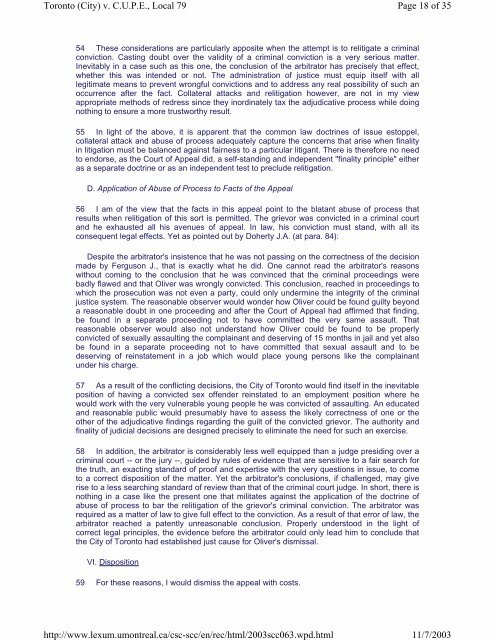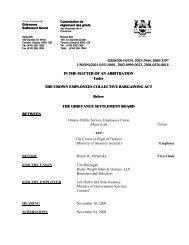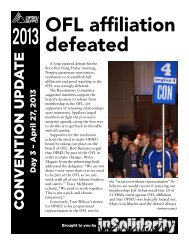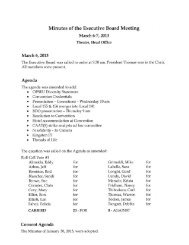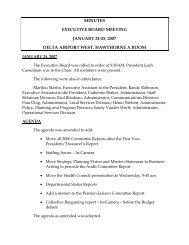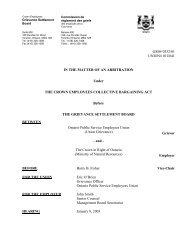C.U.P.E., Local 79 v. Toronto (City) .pdf - OPSEU
C.U.P.E., Local 79 v. Toronto (City) .pdf - OPSEU
C.U.P.E., Local 79 v. Toronto (City) .pdf - OPSEU
You also want an ePaper? Increase the reach of your titles
YUMPU automatically turns print PDFs into web optimized ePapers that Google loves.
<strong>Toronto</strong> (<strong>City</strong>) v. C.U.P.E., <strong>Local</strong> <strong>79</strong><br />
http://www.lexum.umontreal.ca/csc-scc/en/rec/html/2003scc063.wpd.html<br />
Page 18 of 35<br />
11/7/2003<br />
54 These considerations are particularly apposite when the attempt is to relitigate a criminal<br />
conviction. Casting doubt over the validity of a criminal conviction is a very serious matter.<br />
Inevitably in a case such as this one, the conclusion of the arbitrator has precisely that effect,<br />
whether this was intended or not. The administration of justice must equip itself with all<br />
legitimate means to prevent wrongful convictions and to address any real possibility of such an<br />
occurrence after the fact. Collateral attacks and relitigation however, are not in my view<br />
appropriate methods of redress since they inordinately tax the adjudicative process while doing<br />
nothing to ensure a more trustworthy result.<br />
55 In light of the above, it is apparent that the common law doctrines of issue estoppel,<br />
collateral attack and abuse of process adequately capture the concerns that arise when finality<br />
in litigation must be balanced against fairness to a particular litigant. There is therefore no need<br />
to endorse, as the Court of Appeal did, a self-standing and independent "finality principle" either<br />
as a separate doctrine or as an independent test to preclude relitigation.<br />
D. Application of Abuse of Process to Facts of the Appeal<br />
56 I am of the view that the facts in this appeal point to the blatant abuse of process that<br />
results when relitigation of this sort is permitted. The grievor was convicted in a criminal court<br />
and he exhausted all his avenues of appeal. In law, his conviction must stand, with all its<br />
consequent legal effects. Yet as pointed out by Doherty J.A. (at para. 84):<br />
Despite the arbitrator's insistence that he was not passing on the correctness of the decision<br />
made by Ferguson J., that is exactly what he did. One cannot read the arbitrator's reasons<br />
without coming to the conclusion that he was convinced that the criminal proceedings were<br />
badly flawed and that Oliver was wrongly convicted. This conclusion, reached in proceedings to<br />
which the prosecution was not even a party, could only undermine the integrity of the criminal<br />
justice system. The reasonable observer would wonder how Oliver could be found guilty beyond<br />
a reasonable doubt in one proceeding and after the Court of Appeal had affirmed that finding,<br />
be found in a separate proceeding not to have committed the very same assault. That<br />
reasonable observer would also not understand how Oliver could be found to be properly<br />
convicted of sexually assaulting the complainant and deserving of 15 months in jail and yet also<br />
be found in a separate proceeding not to have committed that sexual assault and to be<br />
deserving of reinstatement in a job which would place young persons like the complainant<br />
under his charge.<br />
57 As a result of the conflicting decisions, the <strong>City</strong> of <strong>Toronto</strong> would find itself in the inevitable<br />
position of having a convicted sex offender reinstated to an employment position where he<br />
would work with the very vulnerable young people he was convicted of assaulting. An educated<br />
and reasonable public would presumably have to assess the likely correctness of one or the<br />
other of the adjudicative findings regarding the guilt of the convicted grievor. The authority and<br />
finality of judicial decisions are designed precisely to eliminate the need for such an exercise.<br />
58 In addition, the arbitrator is considerably less well equipped than a judge presiding over a<br />
criminal court -- or the jury --, guided by rules of evidence that are sensitive to a fair search for<br />
the truth, an exacting standard of proof and expertise with the very questions in issue, to come<br />
to a correct disposition of the matter. Yet the arbitrator's conclusions, if challenged, may give<br />
rise to a less searching standard of review than that of the criminal court judge. In short, there is<br />
nothing in a case like the present one that militates against the application of the doctrine of<br />
abuse of process to bar the relitigation of the grievor's criminal conviction. The arbitrator was<br />
required as a matter of law to give full effect to the conviction. As a result of that error of law, the<br />
arbitrator reached a patently unreasonable conclusion. Properly understood in the light of<br />
correct legal principles, the evidence before the arbitrator could only lead him to conclude that<br />
the <strong>City</strong> of <strong>Toronto</strong> had established just cause for Oliver's dismissal.<br />
VI. Disposition<br />
59 For these reasons, I would dismiss the appeal with costs.


